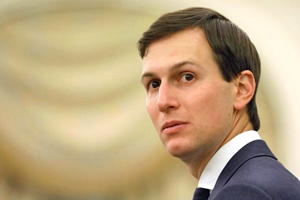Washington, May 26: The FBI is investigating meetings that US President Donald Trump's son-in-law, Jared Kushner, had in December with Russian officials, The Washington Post and NBC News reported Thursday.
Meanwhile, the chairman of the House oversight committee asked the FBI to turn over more documents about former director James Comey's interactions with the White House and Justice Department, including materials dating back nearly four years to the Obama administration.
The FBI and the oversight committee - as well as several other congressional panels - are looking into Russian meddling in the 2016 presidential election and possible connections between Russia and the Trump campaign. Trump fired Comey May 9 amid questions about the FBI's investigation, which is now being led by special counsel Robert Mueller, a former FBI director.
Kushner, a key White House adviser, had meetings late last year with Russia's ambassador to the US, Sergey Kislyak, and Russian banker Sergey Gorkov.
The Post story cited anonymous "people familiar with the investigation," who said the FBI investigation does not mean that Kushner is suspected of a crime.
Kushner attorney Jamie Gorelick released a statement saying: "Mr. Kushner previously volunteered to share with Congress what he knows about these meetings. He will do the same if he is contacted in connection with any other inquiry."
Earlier Thursday, House oversight committee chairman Jason Chaffetz told acting FBI Director Andrew McCabe that he wants records of Comey's contacts with the White House and Justice Department dating to September 2013, when Comey was sworn in as FBI director under President Barack Obama.
In a letter to McCabe, Chaffetz said he is seeking to review Comey's memos and other written materials so he can "better understand" Comey's communications with the White House and attorney general's office.
Chaffetz, R-Utah, previously requested Comey's recent memos about his private contacts with Trump. But the bureau told him Thursday it could not yet turn them over because of Mueller's probe.
Chaffetz, who said last week he has his "subpoena pen" ready to force Comey or the FBI to turn over the documents, told McCabe that "Congress and the American public have a right and a duty to examine this issue independently of the special counsel's investigation."
He added, in a thinly veiled threat, "I trust and hope you understand this and make the right decision - to produce these documents to the committee immediately and on a voluntary basis."
Chaffetz's letter comes a month before he is scheduled to leave office after abruptly announcing his resignation earlier this year. He canceled a hearing scheduled Wednesday after Comey declined to testify.
Assistant FBI Director Gregory Brower told Chaffetz on Thursday the agency is evaluating his request and will update him as soon as possible.
Some Republican members of Congress have pressured Chaffetz to step down from the Comey probe, saying it should be led by someone who will remain in Congress.
Rep. Trey Gowdy, R-S.C, is considered the front-runner to replace Chaffetz as oversight chair. Gowdy led a special House panel that spent more than two years investigating the deadly 2012 attacks at a US diplomatic compound in Benghazi, Libya.





Comments
Add new comment